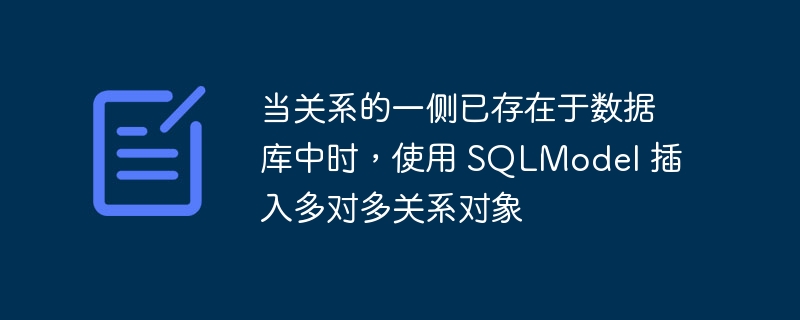當關係的一側已存在於資料庫中時,使用 SQLModel 插入多對多關係對象
- WBOYWBOYWBOYWBOYWBOYWBOYWBOYWBOYWBOYWBOYWBOYWBOYWB轉載
- 2024-02-06 08:00:101643瀏覽

我正在嘗試使用 sqlmodel 在資料庫中插入記錄,其中資料如下所示。 一個 house 對象,它有顏色和許多位置。 地點也將與許多房屋相關聯。輸入為:
[
{
"color": "red",
"locations": [
{"type": "country", "name": "netherlands"},
{"type": "municipality", "name": "amsterdam"},
],
},
{
"color": "green",
"locations": [
{"type": "country", "name": "netherlands"},
{"type": "municipality", "name": "amsterdam"},
],
},
]
這是我正在嘗試做的事情的可重現範例:
import asyncio
from typing import list
from sqlalchemy.ext.asyncio import create_async_engine
from sqlalchemy.orm import sessionmaker
from sqlmodel import field, relationship, sqlmodel, uniqueconstraint
from sqlmodel.ext.asyncio.session import asyncsession
database_url = "sqlite+aiosqlite:///./database.db"
engine = create_async_engine(database_url, echo=true, future=true)
async def init_db() -> none:
async with engine.begin() as conn:
await conn.run_sync(sqlmodel.metadata.create_all)
sessionlocal = sessionmaker(
autocommit=false,
autoflush=false,
bind=engine,
class_=asyncsession,
expire_on_commit=false,
)
class houselocationlink(sqlmodel, table=true):
house_id: int = field(foreign_key="house.id", nullable=false, primary_key=true)
location_id: int = field(
foreign_key="location.id", nullable=false, primary_key=true
)
class location(sqlmodel, table=true):
id: int = field(primary_key=true)
type: str # country, county, municipality, district, city, area, street, etc
name: str # amsterdam, germany, my street, etc
houses: list["house"] = relationship(
back_populates="locations",
link_model=houselocationlink,
)
__table_args__ = (uniqueconstraint("type", "name"),)
class house(sqlmodel, table=true):
id: int = field(primary_key=true)
color: str = field()
locations: list["location"] = relationship(
back_populates="houses",
link_model=houselocationlink,
)
# other fields...
data = [
{
"color": "red",
"locations": [
{"type": "country", "name": "netherlands"},
{"type": "municipality", "name": "amsterdam"},
],
},
{
"color": "green",
"locations": [
{"type": "country", "name": "netherlands"},
{"type": "municipality", "name": "amsterdam"},
],
},
]
async def add_houses(payload) -> list[house]:
result = []
async with sessionlocal() as session:
for item in payload:
locations = []
for location in item["locations"]:
locations.append(location(**location))
house = house(color=item["color"], locations=locations)
result.append(house)
session.add_all(result)
await session.commit()
asyncio.run(init_db())
asyncio.run(add_houses(data))
問題是,當我運行此程式碼時,它嘗試將重複的位置物件與房屋物件一起插入。
我希望能夠在這裡使用 relationship,因為它使存取 house.locations 變得非常容易。
但是,我無法弄清楚如何阻止它嘗試插入重複的位置。理想情況下,我有一個映射器函數來執行 get_or_create 位置。
我所見過的最能實現這一點的是 sqlalchemy 的關聯代理。但看起來 sqlmodel 不支援這一點。
有人知道如何實現這一目標嗎?如果您知道如何使用 sqlalchemy 而不是 sqlmodel 來完成此操作,我有興趣查看您的解決方案。我還沒有開始這個項目,所以如果它能讓我的生活更輕鬆的話,我不妨使用 sqlalchemy。
我還嘗試使用 sa_relationship_kwargs 進行調整,例如
sa_relationship_kwargs={
"lazy": "selectin",
"cascade": "none",
"viewonly": "true",
}
但這會阻止將關聯條目新增至 houselocationlink 表中。
任何指示將不勝感激。即使這意味著完全改變我的方法。
謝謝!
正確答案
我正在寫這個解決方案,因為您提到您願意使用 sqlalchemy。正如您所提到的,您需要關聯代理,但您還需要「唯一物件」。我已將其調整為非同步查詢(而不是同步)功能,與我的個人偏好保持一致,所有這些都沒有顯著改變邏輯。
import asyncio
from sqlalchemy import UniqueConstraint, ForeignKey, select, text, func
from sqlalchemy.orm import DeclarativeBase, mapped_column, Mapped, relationship
from sqlalchemy.ext.asyncio import AsyncSession, create_async_engine
from sqlalchemy.ext.associationproxy import AssociationProxy, association_proxy
class Base(DeclarativeBase):
pass
class UniqueMixin:
cache = {}
@classmethod
async def as_unique(cls, session: AsyncSession, *args, **kwargs):
key = cls, cls.unique_hash(*args, **kwargs)
if key in cls.cache:
return cls.cache[key]
with session.no_autoflush:
statement = select(cls).where(cls.unique_filter(*args, **kwargs)).limit(1)
obj = (await session.scalars(statement)).first()
if obj is None:
obj = cls(*args, **kwargs)
session.add(obj)
cls.cache[key] = obj
return obj
@classmethod
def unique_hash(cls, *args, **kwargs):
raise NotImplementedError("Implement this in subclass")
@classmethod
def unique_filter(cls, *args, **kwargs):
raise NotImplementedError("Implement this in subclass")
class Location(UniqueMixin, Base):
__tablename__ = "location"
id: Mapped[int] = mapped_column(primary_key=True)
name: Mapped[str] = mapped_column()
type: Mapped[str] = mapped_column()
house_associations: Mapped[list["HouseLocationLink"]] = relationship(back_populates="location")
__table_args = (UniqueConstraint(type, name),)
@classmethod
def unique_hash(cls, name, type):
# this is the key for the dict
return type, name
@classmethod
def unique_filter(cls, name, type):
# this is how you want to establish the uniqueness
# the result of this filter will be the value in the dict
return (cls.type == type) & (cls.name == name)
class House(Base):
__tablename__ = "house"
id: Mapped[int] = mapped_column(primary_key=True)
name: Mapped[str] = mapped_column()
location_associations: Mapped[list["HouseLocationLink"]] = relationship(back_populates="house")
locations: AssociationProxy[list[Location]] = association_proxy(
"location_associations",
"location",
# you need this so you can directly add ``Location`` objects to ``House``
creator=lambda location: HouseLocationLink(location=location),
)
class HouseLocationLink(Base):
__tablename__ = "houselocationlink"
house_id: Mapped[int] = mapped_column(ForeignKey(House.id), primary_key=True)
location_id: Mapped[int] = mapped_column(ForeignKey(Location.id), primary_key=True)
location: Mapped[Location] = relationship(back_populates="house_associations")
house: Mapped[House] = relationship(back_populates="location_associations")
engine = create_async_engine("sqlite+aiosqlite:///test.sqlite")
async def main():
data = [
{
"name": "red",
"locations": [
{"type": "country", "name": "Netherlands"},
{"type": "municipality", "name": "Amsterdam"},
],
},
{
"name": "green",
"locations": [
{"type": "country", "name": "Netherlands"},
{"type": "municipality", "name": "Amsterdam"},
],
},
]
async with engine.begin() as conn:
await conn.run_sync(Base.metadata.create_all)
async with AsyncSession(engine) as session, session.begin():
for item in data:
house = House(
name=item["name"],
locations=[await Location.as_unique(session, **location) for location in item["locations"]]
)
session.add(house)
async with AsyncSession(engine) as session:
statement = select(func.count(text("*")), Location)
assert await session.scalar(statement) == 2
statement = select(func.count(text("*")), House)
assert await session.scalar(statement) == 2
statement = select(func.count(text("*")), HouseLocationLink)
assert await session.scalar(statement) == 4
asyncio.run(main())
您可以注意到斷言確實通過,沒有違反唯一約束,也沒有多次插入。我留下了一些內聯註釋,其中提到了這段程式碼的「關鍵」方面。如果多次執行此程式碼,您會注意到僅新增了新的 house 物件和對應的 houselocationlink,而沒有新增新的 location 物件。對於每個鍵值對,只會進行一次查詢來快取此行為。
以上是當關係的一側已存在於資料庫中時,使用 SQLModel 插入多對多關係對象的詳細內容。更多資訊請關注PHP中文網其他相關文章!

